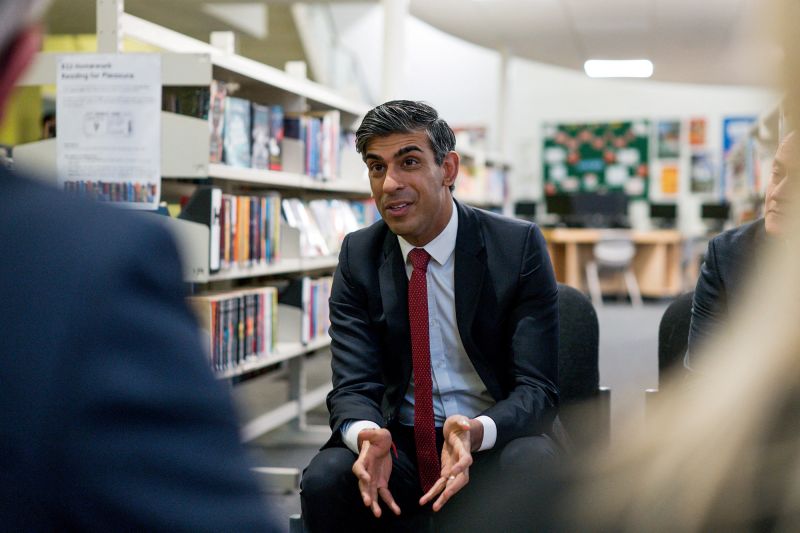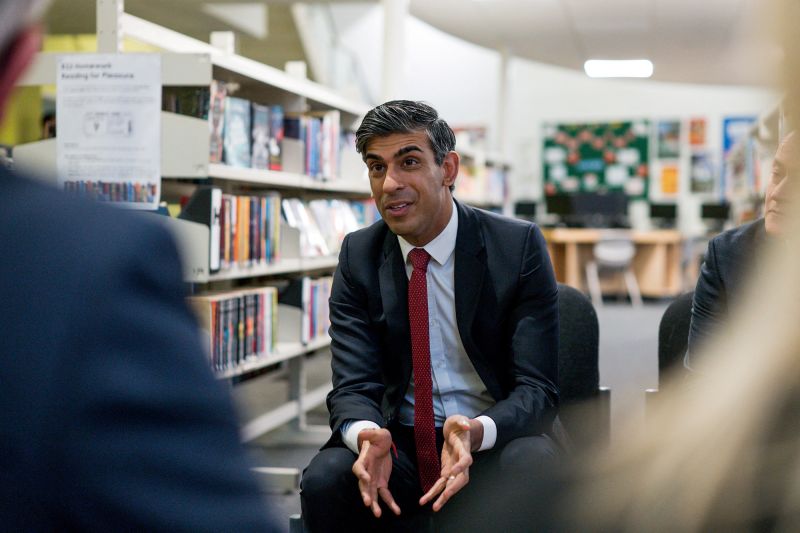
As a general election inches closer into view, the embittered debates circulating inside British politics have entered a new arena: the classroom.
New guidance unveiled by Prime Minister Rishi Sunak’s government on Thursday seeks to overhaul the way sex education and gender identity is taught in England’s schools, a significant intervention into a delicate topic that appeared suddenly on the front pages of Britain’s newspapers a day before the announcement.
The government says the revised guidance, which came amid pressure from a handful of its lawmakers, provides clarity on a complex topic, emphasizing facts over what it calls “contested views” about gender identity.
But critics of the plans – among them a swath of teachers and teaching union leaders – say the move is a politicized attempt to appeal to a narrow cohort of voters the government is in danger of losing, months before a general election.
And they arrived amid what most see as the death throes of Sunak’s flailing government, which has for months seized upon and discarded a number of divisive topics in the hopes of reversing a stubborn polling deficit.
“When the first time you hear about those is in a headline on a tabloid newspaper, then that doesn’t reassure you that the right research is taking place, and that the right level of integrity is behind the decision-making,” Di’lasio said.
“What we’re seeing is young people, and their health and wellbeing, and their care and guidance, being used as a political football.”
‘Utterly disgraceful’
The new draft guidance from the government, published Thursday, takes aim at the way sex and relationships are taught to English children in both primary and secondary schools.
Those lessons have been compulsory at schools in England since 2020, but the government says it reviewed how they are taught after “reports of pupils being taught inappropriate content” in some schools.
Under the new approach, children can’t be taught sex education before the age of nine, while “explicit discussion of sexual activity” will be delayed until children are 13.
Gender identity, or the fact that people can change gender, is meanwhile “highly contested and should not be taught” at all, according to the Department of Education.
The government said that teaching what it calls the “theory” of gender identity “could prompt some children to start to question their gender when they may not have done so otherwise” – a suggestion that has been angrily contested by LGBTQ+ rights groups.
“It is hard to see how rigid limits on what can be discussed and when would be in the best interests of young people – and this may even risk them seeking information from less reliable sources,” Paul Whiteman, general secretary of the National Association of Head Teachers, said in a statement.
Sam Freedman, a senior adviser to the Ark education charity and a senior fellow at the Institute for Government think tank, added on X: “Isn’t something being highly contested a good reason to talk about it in schools – acknowledging that it is highly contested and explaining why?”
The plans will be subject to a nine-week consultation period, which will conclude before the start of Britain’s next school year.
But the uncertain timing of a general election – due by January, and expected in the second half of the year – muddies the waters further as to when, or if, the guidance will ever be implemented.
And, as with many of the government’s recent announcements, its unveiling was accompanied by a string of combative language that played into the “culture war” topics the Conservatives have increasingly sought to thrust into the national discourse.
Education Secretary Gillian Keegan wrote in The Sun newspaper that “teachers are there to teach children facts, not push the agendas of campaign groups.”
“Never again will young girls be taught they might be that little bit happier if they were a boy,” she added.
Transgender rights have been the target of heavy-handed rhetoric from the government for several months, as Sunak looks to goad his opponent, Labour leader Keir Starmer, away from debates about the economy and healthcare, and toward issues surrounding identity.
Those efforts ultimately sparked huge controversy when Sunak made a transgender jibe toward Starmer in Parliament in February, while the mother of Brianna Ghey, a 16-year-old transgender girl who was murdered last year, watched from the public gallery.
“One does wonder whether (the guidance) is connected to the fact that we’re moving into a general election, and it is purely being used to gain votes of a particular section of society,” Di’lasio said.
“It is utterly disgraceful that once again this government has decided to engage in private briefings and media leaks simply to grab headlines,” Whiteman, the head teachers’ union boss, added. “The children and young people of this country deserve better.”
Asked by the BBC on Thursday how widespread “inappropriate” teaching on gender identity was, Keegan admitted: “I don’t think it’s widespread – I mean, I don’t know, because it’s not something that we’ve gone and done a particular survey of.”
Sunak will hope this week’s headlines can add ammunition to his effort to portray himself as a defender of “common sense,” a catch-all term that the prime minister frequently uses as he scrambles to maintain the support of socially conservative voters.
But education specialists worry that school pupils have become the latest victim of that push.
“But when a political ideology comes into it, it becomes more difficult for the whole of the education world to move behind it,” he added. “My worry is that if we’re not careful, there will be young people that are not cared for and not educated in the way we want them to be.”

